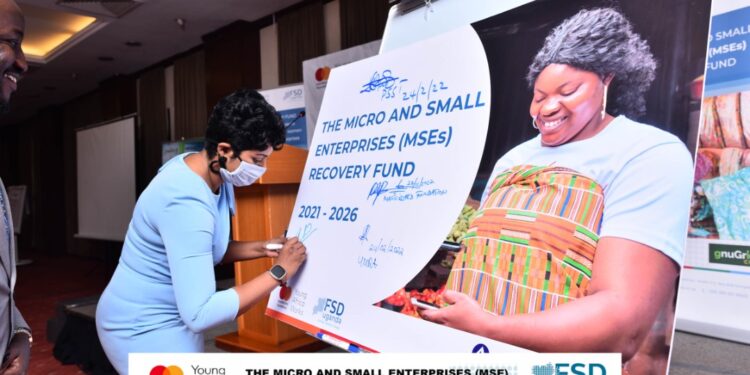Financial Sector Deepening (FSD) Uganda, in partnership with the Mastercard Foundation on Thursday, launched a five year Micro and Small Enterprise (SME) Recovery Fund under Young Africa works initiative.
The initiative is intended to benefit over 50,000 enterprises recovering from Covid-19 pandemic. And over US$20 million (approximately UShs70 billion) fund will be spent to shorten the recovery process of youth and women-owned businesses that employ and sustain the livelihood of millions of Ugandans.
The fund will directly secure 100,000 at-risk jobs while enabling 150,000 additional opportunities for dignified and fulfilling work for young people.
MSEs in the program will receive credit worth between Shs100,000 and Shs10 million, which will be delivered through participating microfinance institutions and SACCOS (Tier III and Tier IV financial institutions).
In addition to supporting MSEs, the fund will also build the resilience of grassroots Financial Service Providers (FSPs) by digitizing workflow processes and strengthening their capacity to attract more long-term institutional capital to address shocks and ensure the sustainability of systemic growth.
The Executive Director of FSD Uganda, Rashmi Pillai, said that her organization prides itself in working closely with like-minded partners such as the Government of Uganda and the Mastercard Foundation to find solutions that benefit all Ugandans.
“The MSE Recovery Fund was a result of the FSD Uganda 5-waves COVID-19 studies. The studies show that while most people returned to jobs by late 2020, the quality of jobs declined, and net pay was still below pre-pandemic levels for nearly 73 per cent of surveyed adults. Individuals and households that worked for and with MSES were the worst hit. That’s why the facility we are launching today is intentional in targeting micro and small enterprises whose credit needs fall between Shs100,000 to Shs10 million. We are confident that this facility will be an excellent complement to the Government of Uganda’s Small Business Recovery Fund,” she added.
Speaking on behalf of the Mastercard Foundation, Adrian Bukenya, the organization’s Country Head, said, “MSMEs are a significant driver of employment in Uganda. So, as the Foundation looks towards enabling 3 million young Ugandans to access dignified and fulfilling work by 2030, we know we can only get there by addressing the residual effects of the pandemic on MSMEs. This facility is about standing with the individuals and businesses that are the backbone of our economy as they bounce back.
The Ministry of Finance Permanent Secretary and Secretary to the Treasury, Ramathan Ggoobi, commended FSD Uganda and the Mastercard Foundation for this initiative, which he said will bolster Uganda’s effort to accelerate growth and revive the economy.
“I am pleased that these organizations are targeting MSEs that employ most Ugandans. The fund will boost our effort as a government and will help us to cover more ground and support our people to become self-reliant amidst the challenges of the pandemic,” Mr Ggoobi said.
He added that the fund has come in time to redeem many SMEs since the study by the Economic Policy Research Centre (EPRC) and the International Growth Centre (IGC) revealed that only 10 per cent of Micro, Small and Medium Enterprises (MSMEs) in Uganda remained open during the lockdown.
EPRC’s rapid assessment study of August 2021, on the effect of the COVID 19 lockdown on livelihoods and MSMEs, further established that Uganda’s SMEs are “hanging in there” to see the next day with the majority of them far from being resilient.
“Through Government’s strategic interventions to mitigate the economic and health impacts of the pandemic, coupled with the easing of containment measures, there has been a modest acceleration in the pace of economic activities, registering a real GDP growth rate of 3.4 per cent last financial year. The economy is expected to further grow between 3.5 4.0 per cent in FY2021/22, supported by the further easing of containment measures, increase in the vaccination rates and continued government interventions to ensure recovery in small and medium enterprises,” Mr Ggoobi stated.
Nevertheless, he asked FSD Uganda and other partners to come up with a better way so that beneficiaries in this program don’t again parade themselves in other initiatives such as Myooga, and recovery funds from the government.
The MSEs Recovery Fund will be implemented in partnership with ASIGMA, the facility manager, who will ensure effective management of the funds, and gnuGrid, who will be tasked with the implementation of the credit referencing services to improve the processes of selected financial service providers.
The first beneficiaries are expected to receive their money in April and they are around 8-10 Participating Financial Institutions (PFIs). Between Shs882.1m-7bn will be spent in the first year taking care of over 1000 SMEs.
Qualifications for the funds:
According to the managing Director of ASIGMA David Nanambi Wakyiku, applicants must be registered and operating within Uganda.
They must produce evidence of operating in the priority sectors of Agriculture/agri-business, light manufacturing, construction, tourism, health, education, trade and services (Transport and warehouse).
Applicants must be having a credit need that ranges between Shs100,000 to a maximum of Shs10,000,000. And the selected institutions will include regulated microfinance firms, digital lenders and SACCOs who must possess; Licence from the Bank of Uganda or Uganda Microfinance Authority (UMRA) or a registration certificate with the Ministry of Trade, Industry and Cooperative and at least 70 per cent of their employees must be young women or men.
“The MSE facility does not mandate interest rate caps to participate financial institutions instead the facility will provide concessional financing to participating financial institutions (not more than 2.5 per cent per annum in Uganda Shillings),” said Mr Nanambi.
Do you have a story in your community or an opinion to share with us: Email us at editorial@watchdoguganda.com













